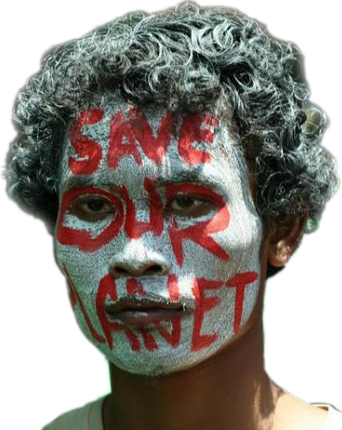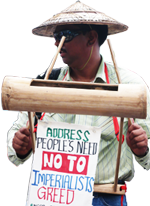Who we are
 The Peoples' Movement on Climate Change (PMCC) seeks to advance the People's Protocol on Climate Change as the Southern peoples' strategy and response to the climate change issue.
The Peoples' Movement on Climate Change (PMCC) seeks to advance the People's Protocol on Climate Change as the Southern peoples' strategy and response to the climate change issue.
What we advocate
|
The Peoples' Protocol on Climate Change (PPCC) aims to involve the grassroots sectors in the climate change discourse by developing their capacities for engagement and action. It also aims to pressure governments and international bodies to put the people's perpectives and aspiration on the negotiating table in drawing up a post-2012 climate change framework. |
Arabic English Amharic Bengali Spanish Francais for printing |
Why we advocate

The people are the worst affected and yet are the least empowered. It is urgent, more than ever, for the people to unite and create their own spaces to raise their own concerns and issues on climate change.
Member Login
Syndicate
PPCC's five-point platform for action
- Comprehensive and concerted but differentiated and equitable global effort to achieve deep, rapid, and sustained emissions reductions to stabilize CO2 concentrations at 350ppm and hold global average temperature rise to 1.5 degrees Celsius.
- Demand the reparation of Southern countries and the poor by Northern states, TNCs, and Northern-controlled institutions to redress historical injustices associated with climate change.
- Reject false solutions that allow Northern states and corporations to continue harming the environment and communities, provide new and greater opportunities for profit, and reinforce and expand corporate control over natural resources and technologies.
- Struggle for ecologically sustainable, socially just, pro-people, and long-lasting solutions.
- Strengthen the peoples' movement on climate change.
| Copenhagen agreement must uphold human rights - climate activists |  |
 |
| Thursday, 10 December 2009 15:46 | |||
|
"Climate change causes human rights violations at every turn, from new health risks, to mass migration, to falling food and water supplies, to the disappearance of shelter, land, lives, livelihoods, and cultures. And those worst affected are the same ones whose rights protections are already precarious - the poor in developing countries, women, farmers, coastal and island dwellers, and indigenous people," says Wahu Kaara of the PMCC.
Contact Persons:
Like it? Share it!
|

 COPENHAGEN, DENMARK (10 December 2009) - On Human Rights Day, the Peoples' Movement on Climate Change (PMCC) demand negotiators in the UN Climate Change Conference to make human rights the center of their negotiations for a global climate deal.
COPENHAGEN, DENMARK (10 December 2009) - On Human Rights Day, the Peoples' Movement on Climate Change (PMCC) demand negotiators in the UN Climate Change Conference to make human rights the center of their negotiations for a global climate deal.
 "A deal like this," according to Don Marut of PMCC, "will effectively lock rich countries' disproportionate share of the atmospheric space, and take away from developing countries and their poor majorities the right to develop. It asks the poor to remain in poverty, while they suffer from climate change. Poor countries cannot be expected to prioritize emissions cuts, not while millions in them still struggle to overcome poverty and realize their rights.
"A deal like this," according to Don Marut of PMCC, "will effectively lock rich countries' disproportionate share of the atmospheric space, and take away from developing countries and their poor majorities the right to develop. It asks the poor to remain in poverty, while they suffer from climate change. Poor countries cannot be expected to prioritize emissions cuts, not while millions in them still struggle to overcome poverty and realize their rights.
